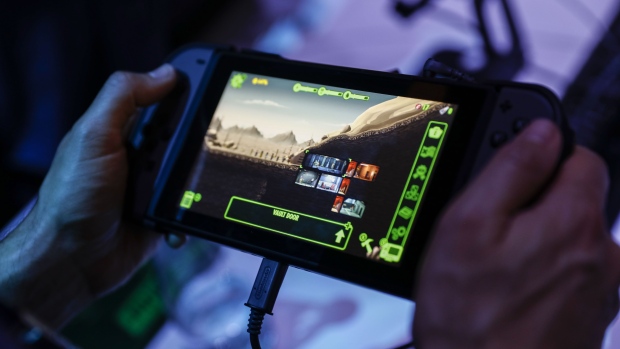Dec 3, 2019
Nintendo Faces Familiar Foes in Return to China With Switch
, Bloomberg News

(Bloomberg) -- Nintendo Co. and Tencent Holdings Ltd. will soon release the Switch console in China. But for all the name recognition, marketing muscle and fan base behind it, the device is unlikely to get off to a fast start in the world’s largest gaming market.
Teased by Tencent in a social media post Tuesday, the Switch’s impending release in China has excited Nintendo investors hopeful of tapping a new market. Yet it’s constrained by the rise of smartphones as the dominant gaming platform in China, and by the reluctance of gamers to buy consoles via official channels because of their limited range of Beijing-approved games.
Nintendo’s Switch retains its global popularity three years after launch, but growth will slow in coming years in an industry where consoles are often revamped every half-decade or so. Getting into China could extend its longevity, but Nintendo’s first issue is that fans in China who might have wanted and could afford a Switch are likely to have one by now.
“Many Chinese people buy Switch in Japan and come back to their home country with it,” said Hideki Yasuda, an analyst at Ace Research Institute in Tokyo. “Chinese people know Mario, Zelda and Pokemon through the media, and the more income they get, the more they want to buy Switch and software.”
Tencent has scheduled an event in Shanghai to discuss Nintendo collaboration for 10:30 a.m. local time Wednesday, according to local media.
Read more: Nintendo Will Prove the Switch’s Longevity This Holiday Season
At the packed Switch booth in August during ChinaJoy -- the country’s biggest gaming show -- fans waited as long as two hours to try marquee titles like The Legend of Zelda: Breath of the Wild. Many in line brought their own Switch -- whether acquired overseas or on the gray market -- and just wanted to check whether the Chinese versions of their favorite games would be any different due to censorship.
Worries about Tencent’s potential influence on Nintendo’s content are not unfounded. Two of the Chinese internet giant’s recent hits have been patriotic versions of SimCity and PlayerUnknown’s Battlegrounds, and it has also imposed strict playtime limits on minors -- all in an effort to appease Beijing. Nintendo, for its part, has said that its games are designed for the family and shouldn’t have trouble with regulators.
“The Chinese government often changes the regulations,” said Tomoaki Kawasaki, an analyst at Iwai Cosmo Securities Co., warning about the unpredictability of a regime that earlier this year granted Tencent approval to distribute Super Mario Bros. U in the country.
“We have always been developing game consoles that parents can rest assured to let their children play, that are family-friendly, and that are highly praised by parents,” Nintendo Senior Executive Officer Satoru Shibata said at ChinaJoy.
Read more: Tencent Teams Up With Nintendo-Backed Pokemon to Create Games
This isn’t Nintendo’s first attempt to crack the market. Official console sales in China remain a fraction of the overall gaming arena, as region locks and delayed hardware releases push gamers toward imported options. Nintendo confronted similar challenges in attempts to enter China dating back to 2003. It tried to sell, via a joint venture, its Game Boy Advance, Nintendo 3DS and a peculiar China-only portable console called iQue Player. Rampant piracy and slow game launches made those products unappealing.
The rise of smartphone gaming places a new obstacle in Nintendo’s path, as the Japanese company will have to convince players to carry yet another handheld gadget. Its library of first-party franchises like Super Mario will help, though China already has an inventory of copycat titles -- Let’s Hunt Monsters, a commercially successful Pokemon Go clone, was authored by partner Tencent.
For Nintendo and Tencent, selling Switch consoles in China is just one component of a partnership that’s ratcheting up. The two are reported to be working together on games for the U.S. as well as China, and Tencent this summer announced a collaboration with the Nintendo-backed Pokemon Co.
For now, the Japanese company “does not count on business in China,” said Kazunori Ito, an analyst at Morningstar Investment Services in Tokyo. “Nintendo needs to get know-how for selling games in China” and has chosen a good partner in Tencent instead of trying to go it alone.
(Updates with press conference timing in fifth paragraph)
--With assistance from 院去信太郎, Yuki Furukawa and Takashi Amano.
To contact the reporters on this story: Vlad Savov in Tokyo at vsavov5@bloomberg.net;Zheping Huang in Hong Kong at zhuang245@bloomberg.net
To contact the editors responsible for this story: Peter Elstrom at pelstrom@bloomberg.net, Vlad Savov, Edwin Chan
©2019 Bloomberg L.P.





